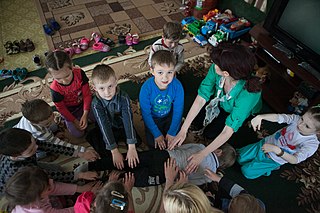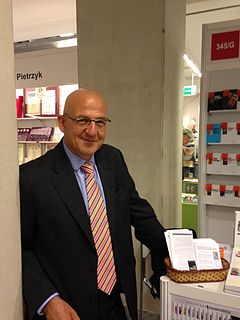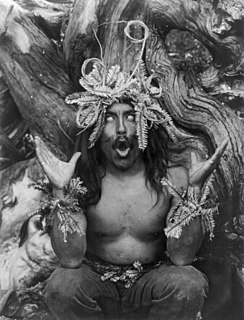Related Research Articles

Cognitive behavioral therapy (CBT) is a psycho-social intervention that aims to improve mental health. CBT focuses on challenging and changing unhelpful cognitive distortions and behaviors, improving emotional regulation, and the development of personal coping strategies that target solving current problems. Originally, it was designed to treat depression, but its uses have been expanded to include treatment of a number of mental health conditions, including anxiety. CBT includes a number of cognitive or behavior psychotherapies that treat defined psychopathologies using evidence-based techniques and strategies.
Psychotherapy is the use of psychological methods, particularly when based on regular personal interaction with adults, to help a person change behavior and overcome problems in desired ways. Psychotherapy aims to improve an individual's well-being and mental health, to resolve or mitigate troublesome behaviors, beliefs, compulsions, thoughts, or emotions, and to improve relationships and social skills. There is also a range of psychotherapies designed for children and adolescents, which typically involve play, such as sandplay. Certain psychotherapies are considered evidence-based for treating some diagnosed mental disorders. Others have been criticized as pseudoscience.
Neuro-linguistic programming (NLP) is a pseudoscientific approach to communication, personal development, and psychotherapy created by Richard Bandler and John Grinder in California, United States, in the 1970s. NLP's creators claim there is a connection between neurological processes (neuro-), language (linguistic) and behavioral patterns learned through experience (programming), and that these can be changed to achieve specific goals in life. Bandler and Grinder also claim that NLP methodology can "model" the skills of exceptional people, allowing anyone to acquire those skills. They claim as well that, often in a single session, NLP can treat problems such as phobias, depression, tic disorders, psychosomatic illnesses, near-sightedness, allergy, the common cold, and learning disorders. NLP has been adopted by some hypnotherapists and also by companies that run seminars marketed as leadership training to businesses and government agencies.
Ozone therapy is an alternative medical treatment that introduces ozone or ozonides to the body. In April 2003, the United States Food and Drug Administration (FDA) prohibited all medical uses of ozone, "In any medical condition for which there is no proof of safety and effectiveness", stating "Ozone is a toxic gas with no known useful medical application in specific, adjunctive, or preventive therapy. In order for ozone to be effective as a germicide, it must be present in a concentration far greater than that which can be safely tolerated by man and animals."
Psychodynamic psychotherapy or psychoanalytic psychotherapy is a form of depth psychology, the primary focus of which is to reveal the unconscious content of a client's psyche in an effort to alleviate psychic tension.

Play therapy is a method of meeting and responding to the mental health needs of children and is extensively acknowledged by experts as an effective and suitable intervention in dealing with children’s brain development. It is generally employed with children aged 3 years through 11 and provides a way for them to express their experiences and feelings through a natural, self-guided, self-healing process. As children's experiences and knowledge are often communicated through play, it becomes an important vehicle for them to know and accept themselves.

Applied kinesiology (AK) is a pseudoscience-based technique in alternative medicine claimed to be able to diagnose illness or choose treatment by testing muscles for strength and weakness.
Guided meditation is a process by which one or more participants meditate in response to the guidance provided by a trained practitioner or teacher, either in person or via a written text, sound recording, video, or audiovisual media comprising music or verbal instruction, or a combination of both.
Psycho-oncology is an interdisciplinary field at the intersection of physical, psychological, social, and behavioral aspects of the cancer experience for both patients and caregivers. Also known as psychiatric oncology or psychosocial oncology, researchers and practitioners in the field are concerned with aspects of individuals' experience with cancer beyond medical treatment, and across the cancer trajectory, including at diagnosis, during treatment, transitioning to and throughout survivorship, and approaching the end-of-life. Founded by Jimmie Holland in 1977 via the incorporation of a psychiatric service within the Memorial Sloan Kettering Cancer Center in New York, the field has expanded drastically since and is now universally recognized as an integral component of quality cancer care. Cancer centers in major academic medical centers across the country now uniformly incorporate a psycho-oncology service into their clinical care, and provide infrastructure to support research efforts to advance knowledge in the field.
Energy medicine is a branch of alternative medicine based on a pseudo-scientific belief that healers can channel healing energy into a patient and effect positive results. Practitioners use a number of names including various synonyms for medicine and sometimes use the word vibrational instead of or in concert with energy. In no case is any empirically measurable energy involved: the term refers instead to so-called subtle energy.
Psychoeducation is an evidence-based therapeutic intervention for patients and their loved ones that provides information and support to better understand and cope with illness. Psychoeducation is most often associated with serious mental illness, including dementia, schizophrenia, clinical depression, anxiety disorders, psychotic illnesses, eating disorders, personality disorders and autism, although the term has also been used for programs that address physical illnesses, such as cancer.

Oncology is a branch of medicine that deals with the prevention, diagnosis, and treatment of cancer. A medical professional who practices oncology is an oncologist. The name's etymological origin is the Greek word ὄγκος (óngkos), meaning 1. "burden, volume, mass" and 2. "barb", and the Greek word λόγος (logos), meaning "study".

Maxie Clarence Maultsby Jr. was an American psychiatrist, author of several books on emotional and behavioral self-management, Elected Distinguished Life Fellow of the American Psychiatric Association, and recipient of the Lifetime Achievement Award from the National Association of Cognitive-Behavioral Therapists. He is the founder of the method of psychotherapy called Rational Behavior Therapy, the emotional self-help technique called Rational Self-Counseling, and the New Self-Help Alcoholic Relapse Prevention Treatment Method. He was an Emeritus Professor at the College of Medicine at Howard University in Washington D.C.

The Oasis of Hope Hospital is a clinic in Tijuana, Mexico providing alternative cancer treatments to its customers. The clinic was founded by the physician Ernesto Contreras. After his death in 2003, the management of the hospital was taken over by his son, Francisco Contreras, and nephew, Daniel Kennedy.

Tomasz Witkowski is a Polish psychologist, skeptic and science writer. He is known for his unconventional campaigns against pseudoscience. He specializes in debunking pseudoscience, particularly in the fields of psychology, psychotherapy, and diagnostics. Witkowski also engages in debates on pseudoscience-related topics, emphasizing scientific skepticism.

Jeanne Achterberg was an American psychologist known for investigating the therapeutic application of guided imagery and creative visualization.
Eclectic psychotherapy is a form of psychotherapy in which the clinician uses more than one theoretical approach, or multiple sets of techniques, to help with clients' needs. The use of different therapeutic approaches will be based on the effectiveness in resolving the patient's problems, rather than the theory behind each therapy.

Psychology Gone Wrong: The Dark Sides of Science and Therapy is a 2015 book written by Tomasz Witkowski and Maciej Zatonski.

Psychology Led Astray: Cargo Cult in Science and Therapy is a book written by Tomasz Witkowski and published in 2016.
References
- 1 2 Nelson, Valerie J. (2009-07-03). "O. Carl Simonton dies at 66; oncologist pioneered mind-body connection to fight cancer". latimes.com. Archived from the original on 2017-10-22. Retrieved 2018-05-01.
- 1 2 Friedlander, Edward R. Mental Imagery. In Stephen Barrett. (1991). Dubious Cancer Treatment. Tampa, Florida: American Cancer Society, Florida Division. pp. 73-78.
- 1 2 Stephen Barrett, M.D. "Questionable Cancer Therapies". www.quackwatch.org. Retrieved 2018-05-01.
- 1 2 Friedlander, Edward R. Dream Your Cancer Away: The Simontons. In Douglas Stalker, Clark Glymour. (1985). Examining Holistic Medicine. Prometheus Books. pp. 273-285. ISBN 0-87975-303-X
- 1 2 Tomasz Witkowski (2016). ""Chapter 8: Between Life and Death: The Simonton Method"". Psychology Led Astray: Cargo Cult in Science and Therapy. Boca Raton, FL: BrownWalker Press. ISBN 9781627346108. OCLC 1014067431.
- 1 2 "O. Carl Simonton, M.D". CA: A Cancer Journal for Clinicians. Wiley-Blackwell. 32 (1): 58–61. 1982-01-01. doi: 10.3322/canjclin.32.1.58 . ISSN 0007-9235.